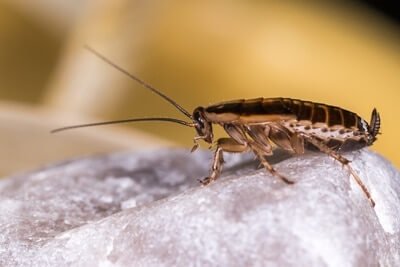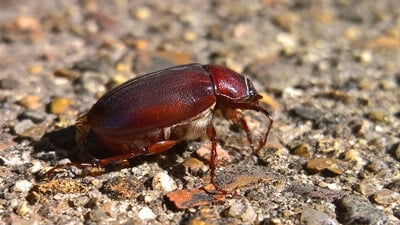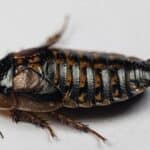The German cockroach (Blattella germanica) is one of the most common species that infest homes. They’re found worldwide, carry diseases, and breed quickly. Just two German roaches can develop a colony of 400+ in 6 months, so you need to act quickly if you find them in your home.
German cockroaches are light brown in color and small in size. They rarely fly, but they may flutter from one spot to the next. They like to hide in kitchen cupboards, under bathroom sinks, in baseboards and trims, and behind appliances. You must use bait traps, dust traps, and sprayed pesticides to eradicate them.
To prevent German cockroaches from invading your home, be sure to empty garbage cans, clear out storage areas, use plastic instead of paper or cardboard, and package up food. Never leave dirty dishes in the sink, and patch up gaps in your home. They don’t bite, but they can spread disease and make existing health conditions worse.
German Cockroach Interesting Facts
As one of the tiniest cockroach species, measuring between 1/2 to 5/8 of an inch in length, the German cockroach is a fascinating creature. Aside from its ability to reproduce at an impressive rate, and its willingness to protect its young, it’s also known for these fun facts:
Thigmotropic
Thigmotropic means that German cockroaches thrive in tight spaces. They can live in small cracks, crevices, and holes. Even when the eggs are developing, they are held in a tight capsule by their mother.
As an adult, they can fit into cracks as thin as a dime. They do this by flattening their exoskeletons close to the ground and splaying their legs so they can fit inside a small gap.
Cockroaches enjoy the feeling of tight spaces surrounding their bodies, preferably on every side. The smaller the space, the happier a German cockroach will be.
Know To Avoid Insecticides
While some German cockroaches can adapt to insecticides and become resistant to them, others can actually learn to avoid pesticides completely.
According to a study from Purdue University, German cockroaches are beginning to develop a resistance towards pesticides. They tested this by exposing them to a series of insecticides and found that they not only developed a resistance to them but passed the resistance onto their offspring.
German cockroaches have an impressive sense of smell and limited memory. This allows them to test a repellent and decide if it hurts them. If they learn that it doesn’t, they may overcome their dislike for the scent and continue past it to feed on whatever that deterrent was protecting.
Reach Maturity Faster Than Other Cockroaches
For German cockroaches, especially males, their lifecycle can last for 100 days. That means several generations can be present in a single colony all at once. Their population will double and quadruple in short order. Cockroaches have the fastest reproduction rate of all cockroaches.
German cockroaches go through 6-7 instars (the developmental stages between molts) before reaching maturity. This takes around 103 days. Male and female German cockroaches live for approximately 200 days or less.
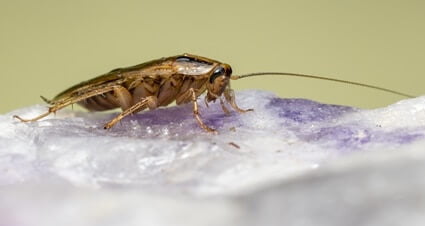
German Cockroach Information
German cockroaches are evolutionarily relentless insects. They have remained almost unchanged in appearance and behavior for around 350 million years.
What Do German Cockroaches Look Like?
On average, a German cockroach is a 1/2 inch to 5/8 an inch long. This makes them one of the smallest cockroach species in the world, alongside the brown-banded cockroach.
They are highly adept at sneaking into tiny spaces around your home, blending in with their light brown coloring. Up close, you will see two dark lines running along the edges of their back.
A German cockroach’s body is oval-shaped and flat. It will feel oily to touch and can be either warm or cold, depending on its environment. The head is small and features a pronotum, which operates as a shield to protect them. If you were to peak closely, you’d see a German cockroach’s mouth is directed back and downwards.
Do German Cockroaches Make Noise?
Unless you have a large German cockroach infestation, you’re unlikely to hear them make sounds. Unlike some wild species, German cockroaches don’t chirp, hiss, or sing.
Instead, they rely on communicating through pheromones, which are chemicals that act like hormones. They don’t affect the individual roach that produces them – they affect the cockroach that receives them. They mostly release pheromones through their feces, If you do hear sounds, this will only be caused by their:
- Wings fluttering
- Bodies knocking against objects as they run past
Since these cockroaches are so small, they’re unlikely to dig into the insulation of your walls or your baseboards. Instead, they can neatly squeeze in through any gaps and build a nest. They do not need to dig away at obstacles or chew through material.
If you hear sounds that you believe are cockroaches, this indicates a large infestation has gotten out of hand. You’re not hearing cockroach sounds; you’re hearing dozens or hundreds of cockroaches moving around.
Do German Cockroaches Like Light?
German cockroaches don’t enjoy the light. They are nocturnal and prefer to scavenge in darkness, as this allows them to avoid predators. They are naturally more active during the night and can scurry around undisturbed at that time. They do not like encountering large creatures, as their only option is to flee.
Because of this, German cockroaches will scatter when a light is turned on. They are not terrified of light itself but of the startling effect of lights being abruptly flicked on.
If necessary, German cockroaches will emerge from their nests during the day. They can roam in the sunlight if they need to:
- Forage in search of food
- Escape an overcrowded nest
- Find shelter in a new home
Can German Cockroaches Survive the Winter?
German cockroaches are cold-blooded. Because of this, they are unable to handle low temperatures for extended periods of time. The cockroaches will freeze to death if the weather dips to 34 degrees Fahrenheit or lower.
If the adults find warmth inside of 1-2 days, they can recover from the cold and return to full health. If temperatures remain consistently cold, they will die.
Eggs are slightly more resistant, able to withstand cold temperatures by halting their incubation period. They may be able to recover after several weeks of chilly weather. If the temperatures get far below freezing, though, they have 3 days at most.
Are German Cockroaches Seasonal?
The behavior of German cockroaches is influenced by the season. They are less active and more dormant whenever the season is wet and cold. Their metabolism is affected greatly by cold weather. If temperatures drop between 40-60 degrees, they will:
- Slow down their movements
- Avoid breeding
- Grow at a reduced pace
- Spend less time foraging
If temperatures continue to drop, they will even stop growing altogether and lose their ability to mate. Because of this, German cockroaches are more active during summer and spring. Spring will be their primary mating season, and in the warmest months, there will be large hatchings of German cockroaches. The heat is excellent for their lifecycles.
With that in mind, you can expect most infestations to get worse during the summer. Egg sacs will be created in abundance and hatch in short order.
On the flip side, you can expect most infestations to begin during the winter or fall. German cockroaches will seek out your home as a warm haven. It will have enough moisture to sustain them but won’t have standing water throughout the rainy season. This will be a perfect habitat to see them through the wet, chilly months.
How Many Eggs Do German Cockroaches Lay?
German cockroaches are considered one of the worst home pests. That’s because of how quickly and effectively they reproduce. A female can lay an egg sac approximately 6 times a year. If this seems like a small amount, remember that each sac will contain 30-40 eggs, equalling approximately 200 to 300 offspring a year.
That’s even more likely because German cockroaches protect their young. Females will carry the egg sac with them until the nymphs hatch, or she’ll deposit them 24 hours before they’re due to hatch. Unlike many other cockroach species, which plant the ootheca in a protected location and leave it to fend for itself. By keeping the offspring with her, she increases their chance of survival.
Depending on the female, her diet, and her environment, she may produce as many as 50 eggs each month. That’s according to Entomologia Experimentalis et Applicata. Throughout her relatively short lifespan, she will create up to 8 of these capsules. It only takes 28 days for the eggs to hatch, with some incubating much quicker than this.
As such, a single mating pair of German cockroaches can spawn a colony 400 strong in just 3-6 months. As the offspring reach maturity and begin reproducing themselves, this can make an infestation devastating to your home in short order.
What Do German Cockroaches Eat?
German cockroaches are omnivorous scavengers with a nigh unbeatable digestive system, according to Applied and Environmental Microbiology. Because of that, they will eat anything organic they find. It’s difficult to give a cockroach food poisoning, and they can siphon out trace nutrients from the most unlikely sources. For example, paint chips and glue can still be a source of fat and calories.
In an ideal situation, though, German cockroaches will prefer foods that are high in fat, grease, starch, and sugar. In the wild, this includes decaying or fermented items, such as rotting fruit or animal carcasses. They also eat plant matter, such as leaves and fungi. In your home, you can find German cockroaches seeking out:
- Leftover food
- Candy
- Starches, be it rice or paper
- Meats
- Gravy and sauces
- Pet food
- Hair and skin flakes
- Cardboard
- Wood shavings
Cockroaches will even eat soap and wallpaper paste. Their bodies enable them to digest glucose, meaning they can turn these inedible objects into digestible nutrients. German cockroaches can live one month without food, but they’ll likely perish after a week without water.
Where Do German Cockroaches Live?
Of all the common household species, German cockroaches are fond of human living spaces and are among the most likely to invade homes. In a commercial setting, they like hotels, food processing plants, restaurants, and similar locales. They will quickly gather up near a water source and find hiding places in:
- Baseboards
- Moldings
- Cupboards or pantries
- Garbage containers
- Under sinks
- In or behind appliances
- In electronic devices
In fact, a German cockroach’s tiny size gives it a massive advantage. It’s difficult to spot at a glance, can fit into nearly any space, and can nest in small areas. Even the interior of your dishwasher, refrigerator, or gaming consoles may work as a haven for these pests.
Where Are German Cockroaches Found?
In the wild, German cockroaches like moist and damp areas. Because they’re so resilient and adaptive, they can handle nearly any climate, making them a problem across the world.
With that said, they struggle in very cold temperatures and will quickly seek out a human home when given the chance. Here, you’ll find German cockroaches most commonly in the bathroom and kitchen areas.
Although called the German cockroach, they’re actually native to Northern Africa, especially in Ethiopia and Sudan. They were brought into Europe through trade lines and quickly flourished on the continent.
As such, when they were given their scientific name of Blattella germanica, at that time, they were thought to be native to Germany. After all, their populations had become a regular and expected problem in this region.
The Difference Between Male and Female German Cockroaches
At a glance, male and female German cockroaches look identical. When you take a closer look, though, there are distinct features.
- The females are darker in color than their male counterparts.
- The back end of a male cockroach is tapered, while the females have a rounded body.
- The terminal parts of the abdomen are visible in the male, but covered by the tegmina in the females.
- Males are slender and small in size when compared with females.
- Females have a broad mid-section, seeming well-fed and chunky.
- If the female is ‘pregnant’, or carrying her ootheca, it can be seen as a protrusion about a ¼ inch in size. She may even seem engorged.
Can German Cockroaches Fly?
Although German cockroaches have wings, they don’t truly fly. Instead, the wings allow these insects to glide from high vantage points. They may leap from your countertops and flutter to the ground, but they will not fly up toward you.
Likewise, if they do glide, they have little to no coordination. Instead, German cockroaches use their wings as a protective layer for their back. They also serve as a way to help maintain their balance when necessary.
Do German Cockroaches Bite?
German cockroaches do not bite humans. Their mouths are too small to latch onto our skin properly. Furthermore, they have no desire to feed on living creatures, as they are scavengers. They only eat rotting food or food that is otherwise soft, so they can tear at it with their mandibles.
Of course, if a German cockroach is starving, it may try to bite a human. It will rarely attack you while you’re awake and moving, however. Even if you pick one up, it will flail and try to escape. The only time that biting a human seems appealing is when you’re asleep. The cockroach may try to feed off dandruff, hair, or skin cells.
Is It Hard to Get Rid of German Cockroaches?
It’s very difficult to clear German cockroaches out of your home. That’s because:
- They reproduce at an impressive rate.
- Their lifecycle is short but effective.
- They tend to invade homes in large numbers.
- They’re very skilled at hiding, so you won’t find the nest easily.
- They can wiggle into small spaces, avoiding pesticide sprays or baits.
- They typically hide in kitchens and bathrooms, where you can’t be too heavy-handed with insecticides.
- They eat organic waste, like mildew in your bathroom or stray crumbs in your kitchen, so starving them out is difficult.
Worst of all, as mentioned, German cockroaches have been discovered to build a resistance to certain pesticides, according to the Journal of Economic Entomology. If one generation was exposed to a poison and survived, the next one may be unaffected by it.
How to Remove German Cockroaches
Even still, there are ways to remove German cockroaches. The key will be patience, persistence, and a combination of different pesticides.
Sanitation
To ensure all your other measures are effective, you need to prep your home. German cockroaches can easily hunker down and avoid the pesticides you spray. They can also feed on little scraps throughout your home and avoid your baits. To prevent this:
- Vacuum all your rooms to remove pet hair, dander, and crumbs.
- Empty your pantries, put food in sealed containers, and throw away any food that’s been exposed to cockroaches.
- Thoroughly bleach your kitchen, bathroom, and other living spaces with a diluted solution.
- Use cleaning agents with citrus added to them, so the areas are not only sanitized, but able to deter cockroaches.
- Move appliances and clean behind them, destroying any nests.
- Inspect any electronics, such as kitchen mixers or Blu-ray players for signs of cockroaches, and remove any traces.
Treatment
Now that your home is prepped, it’s time for the insecticides. You will need to combine:
- Bait Traps. These lure cockroaches out, poison them, and make them carry the poison home to their colony.
- Dust Traps. They poison the cockroaches on their normal foraging routes and kill them when you’re not around.
- Sprayed Pesticides. These kill off any cockroaches you spot, allowing you to trim their numbers by hand.
If one treatment method is used by itself, it may not be effective. Not only can cockroaches build immunity, but a large infestation can’t be handled by just one measure. They may thrive when you’re not around, they may ignore the baits, or they may set up new foraging routes.
In that vein, if you don’t notice results within 1-2 weeks, consider changing to a different insecticide brand. These bugs may be resistant to it. Inside of 3-4 weeks, you should find the cockroach problem lessening considerably or disappearing.
Professional Removal
German cockroaches are very durable and persistent. Luckily, exterminators have access to a broader range of insecticides than what is available on the open market. They can apply a more widespread solution that’s both heavy-handed and necessary.
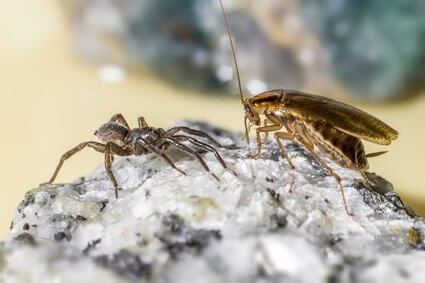
Can You Prevent German Cockroaches?
The best way to stop a German cockroach infestation is to prevent them from ever arriving. If you’ve dealt with an outbreak before or are concerned that your home is vulnerable to one, you can take action. Use these measures to deter German cockroaches from your home:
Empty Trash Cans
German cockroaches will naturally be drawn to kitchen and bathroom garbage cans. There’s plenty of organic waste they can feast on. As such, empty the cans frequently and be sure to scrub them down afterward. Any spills or leftover residue will quickly become a lure.
Remove Food Crumbs And Scraps
After you have finished eating, put all the dishes in the sink and wash the area down. Wipe over where you were sitting to get rid of crumbs or food particles that can attract cockroaches. Sweep often if you have children that may leave food lying around.
Don’t Leave Pet Food Out
If you free-feed your animals, then reconsider that tactic for now. Cockroaches will eat from your pets’ food bowls. After your dog or cat’s meal, clean out the bowl so that no traces are left behind. You should also store your pet’s food in air-tight plastic containers or metal bins that cockroaches can’t get through. Their strong mandibles will chew through cardboard boxes or flimsy plastic packaging.
Avoid Dirty Dishes In The Sink
Don’t get into the habit of putting your dishes in the sink or dishwasher and leaving them there overnight. If you wash everything before you go to bed, that will remove any lingering smells that encourage cockroaches to scavenge.
They will likely seek out food once the house is quiet and everyone is asleep. Be sure to clean out your sink drain and don’t leave food particles sitting in there for the cockroaches to enjoy.
Avoid Clutter
If you have an attic or garage, don’t leave stuff lying around that you don’t use or need. Cockroaches love clutter, where they can hide and breed. Instead, store items in plastic, sealable containers and throw out everything else. Opt for plastic or metal boxes rather than cardboard.
Seal Pipes And Avoid Moisture
Be sure that all your water pipes are sealed and that your ventilation ducts are properly cleaned. This can be a hassle and may require professional intervention. However, leaving gaps or allowing your HVAC to become filled with dust will give cockroaches something to feast on.
Why Are There German Cockroaches In My House?
German cockroaches can enter your home for any reason. However, you will be at greater risk if you have:
- Warm appliances
- A particularly moist and humid bathroom
- Multiple heater vents, especially ones close to entryways like windows and doors
- Gaps in your baseboards, molding, and trim
- Pantries with food exposed
- Full trash bags in your garage or near your home before trash services gather them
- Storage areas that are dark, quiet, and potentially damp
All of these factors can be appealing to a German cockroach. For that reason, be sure to inspect your home regularly to make sure you’ve removed any attractants.
If you spot signs of an infestation, then be sure to set out traps and arm yourself with insecticide spray immediately. The faster you react, the more effective you’ll be against these agonizing pests.
